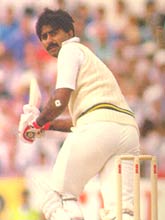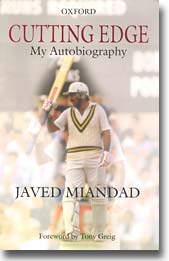Home > Cricket > Special
Mr Controversy
July 03, 2003
Dennis was a naturally hostile fast bowler, without doubt one of the very best I have played against. I respected his skill, but I was in no mind to step away from it.
That Perth Test started out well for us as our fast bowlers Imran and Sarfraz bowled Australia out for 180 in the first innings. When our turn came we couldn't handle the pace of the Perth wicket and our response was disastrous. At one point we were 26-8, and eventually managed 62, at the time Pakistan's lowest ever Test score. Australia then piled up 424-8 declared, leaving us a target of 543 with nearly two days to spare.
 The encounter with Lillee happened when I was batting in the second innings. The crowd was worked up and was chanting 'KILL, KILL, LILL-EE' each time Lillee ran in to bowl. I had come in at 27-2 and was painstakingly trying to rebuild the innings in a third wicket partnership with Mansoor Akhtar. With the score 78-2, I played a delivery from Dennis towards the square-leg umpire and pushed off for a single. About three-quarters down the pitch, I collided with him as he had stepped back at the last minute to block my path. Since I had to make my ground, I just pushed him out of the way and got to the safety of the non-striker's end. As Dennis passed me on the way back to his run-up, he kicked me on the pad and swore at me. Almost in reflex, I turned around and threatened him with my bat.
The encounter with Lillee happened when I was batting in the second innings. The crowd was worked up and was chanting 'KILL, KILL, LILL-EE' each time Lillee ran in to bowl. I had come in at 27-2 and was painstakingly trying to rebuild the innings in a third wicket partnership with Mansoor Akhtar. With the score 78-2, I played a delivery from Dennis towards the square-leg umpire and pushed off for a single. About three-quarters down the pitch, I collided with him as he had stepped back at the last minute to block my path. Since I had to make my ground, I just pushed him out of the way and got to the safety of the non-striker's end. As Dennis passed me on the way back to his run-up, he kicked me on the pad and swore at me. Almost in reflex, I turned around and threatened him with my bat.
Dennis's was an outrageous gesture but obviously he contemplated it because he thought he could get away with it, or at least get off lightly. We were after all only from Pakistan and he felt he could take liberties with us. Had I been captain of England, I wonder if the idea of retaliating with a kick on the pads would even have entered Dennis's mind.
The Australian media compounded the situation. They really played up the incident and their incessant coverage made the whole thing much bigger than it deserved to be. I was projected as a miscreant because after Dennis had kicked me, I had swung around and threatened him with my bat. What was I supposed to do, bend over and ask for more? The media ran riot. They tried to suggest I was responsible for starting the whole mess in the first place and tried to seal my guilt by referring to the brandishing of my bat. In fact, I had tolerated a volley of abuse from Dennis and my threatening him with my bat should have been seen in the context of that abusive exchange and the heated atmosphere in which it had taken place.
When the dust settled, Dennis received a censure from the Australian Cricket Board and a fine of (Australian) $200. To my great astonishment, certain individuals in the Pakistan team lobbied with our own team management for me to get a fine or some other kind of punishment. These players' reasoning mystified me. I was first blocked from completing a run and then provoked into anger, and for that indeed to be punished?
These finger-pointers should have paid attention to people with better judgment than their own. The highly respected former Australian leg-spinner Bill O'Reilly, in an opinion column in the Sydney Morning Herald, noted, 'Lillee should have been instructed to leave the field, temporarily at least. If the [Australian Cricket] Board is prepared to do its job, Lillee is due now for along holiday.' O'Reilly also termed' utter eyewash' the suggestion from some quarters that I had somehow been 'baiting' Lillee.
WARS WITH INDIA
The next time we toured India was in the early part of the 1983-84 season. The tour proved an anti-climax after the eventful 1979-80 tour and the exciting home series in Pakistan in 1982-83. In 1983-84, we played three Tests and two One-Day Internationals. It was a dull series with all three Tests drawn.
Sunil Gavaskar had been the Indian captain when we had toured in 1979-80, but Kapil Dev had now replaced him. Although Gavaskar was still in the team, India were nevertheless missing some key players, notably Gundappa Vishwanath, Ravi Shastri and Dilip Vengsarkar.
Pakistan were missing Imran, who was unavailable because of his stress-fractured shin, and the team was led by Zaheer Abbas. It remained a relatively low-profile series.
I remember getting out for 99 in the first Test, at Bangalore—the only such instance in my career. It was a simple case of wanting to play my shots at all times. Even though I was batting on 99, I still felt like smashing a square-drive off a good-length ball from Madan Lal. Unfortunately it found the hands of Kris Srikkanth who took a good low catch.
 During that innings of 99 I had some memorable exchanges with Dilip Doshi, India's tireless left-arm spinner. I was playing quite freely and Dilip had been forced to set a defensive limited-overs style field. Almost everyone was at the boundary ropes. Every now and then, I would deliberately play a lofted stroke towards silly point or short cover, and each time I did that I would tell Dilip he could have had me caught had he kept a fielder there. Dilip knew I was toying with him, and I could see it was getting to him.
During that innings of 99 I had some memorable exchanges with Dilip Doshi, India's tireless left-arm spinner. I was playing quite freely and Dilip had been forced to set a defensive limited-overs style field. Almost everyone was at the boundary ropes. Every now and then, I would deliberately play a lofted stroke towards silly point or short cover, and each time I did that I would tell Dilip he could have had me caught had he kept a fielder there. Dilip knew I was toying with him, and I could see it was getting to him.
A little later in the innings, I asked Dilip what the number of his hotel room was. Both teams were staying at the same hotel, very near the stadium. Dilip tried to ignore me but I could see the question perplexed him. Each time he would come in to bowl, I would ask him the same thing. Finally he got exasperated and complained to Sunil Gavaskar, who was fielding not far off. With great irritation, he asked Sunil 'Why does Javed keep asking me for my hotel room number?'
Sunil just shrugged his shoulders and looked at me. I decided to put Dilip out of his misery. 'You've put all your fielders so far away, why don't you place one of them in your hotel room.' Dilip wasn't amused, and Sunil just looked at me and gave a knowing smile.
I enjoyed doing this to Dilip because I knew it would get him worked up, but it was just light-hearted stuff as Dilip and I were good friends and there were never any hard feelings in our exchanges.
Excerpted with the publisher's permission from Javed Miandad's Cutting Edge - My Autobiography, published by Oxford University Press, London, 2003, Rs 450